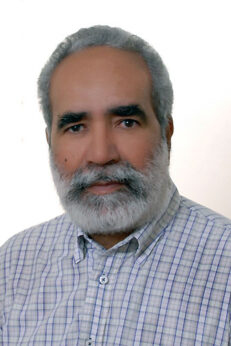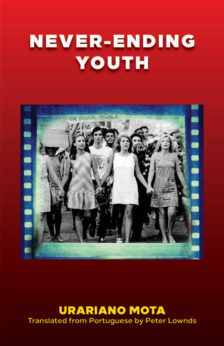
Never-Ending Youth is a 2017 novel by the Brazilian journalist Urariano Mota, active in the clandestine Communist Party of Brazil during the harshest period of the country’s military dictatorship from the late 1960s to the early 1970s. The novel is set in Recife, capital of Pernambuco state and a major city of Brazil’s Northeast, a patriarchal cultural zone which corresponds to the U.S. South as a former plantation area but also as the font of archetypal popular cultural roots.
The novel evokes the struggles of seriously committed idealist youth in a decade associated with cultural and to some extent global political transformation and reinvention. The conceptual focus triangulates between 1) the misadventures of the struggle as scripted by the Party, 2) the vibrant unfolding of a popular and bohemian cultural panorama, particularly through the optics of the Tropicalism movement—itself informed by the North Atlantic youth revolution of the time—and 3) the nature of reminiscence of youthful idealism and heroism by persons now old but still very active, for whom those golden years remain more vital and real than the consumption-soaked present era of democracy.
Presented as memoir, and narrated by a persona who seems to overlap greatly with Mota, it is spiced with literary allusions to the European and Brazilian canons (Turgenev, Goethe, Cervantes; Manuel Bandeira, Drummond de Andrade, Jorge Amado) the Marxist litany of the time (Leninism, Maoism, Che-adulation), and American and Brazilian popular culture (Ella Fitzgerald, Marlon Brando, Nelson Cavaquinho). The anti-heroic self-consciousness of the protagonist/narrator makes for a hall of ironic mirrors, positioned somewhere between Magical Realism and Gonzo journalism.
In line with materialist thinking, the very circumstance of our reading cannot be understood without reference to the collaborative triangulation between sympathetic parties. That includes the American translator, Peter Lownds, a notable Latin American independent scholar and creative writer, and the editor (Eric A. Gordon, an editor at People’s World and like Lownds an independent scholar and translator of Portuguese). Both had formative experiences as young adults in the Brazil of the late 1960s. Fine introductions to this text, a memoir-novel, appear in the book, in Lownds’s foreword and Gordon’s introductory note, which are complemented by the People’s World interview of Lownds by Gordon last June. Lownds was a Peace Corps volunteer in Recife, Gordon a graduate student doing field research in Rio.
Finally, International Publishers is to be commended for the initiative. The book has been carefully copy-edited and, professionally speaking, is well-produced. The translation is remarkably well done. The text is full of local and national references, many of them unfamiliar even to Brazilianists, which are explained briefly through notes. The cadence of the prose, which often presents a stream of highly subjective, quicksilver shifts in psychological point of view, is enchantingly captured, and its flow, which is challenging both conceptually and syntactically, is conveyed with remarkably little friction. This really is a difficult text to translate on multiple fronts, but Lownds is fully up to this labor of love.
Recife as protagonist
Now let’s focus on the content, historical and literary. Recife is as much a protagonist as the individual of the narrative voice. Despite the inevitable imprecisions of such a generalization, the comparison of the Brazilian Northeast to the U.S. South is useful to non-Brazilians. Within the Northeast, a subsequent useful comparative gloss would contrast Recife with the other big Northeastern city, Salvador, the capital of the state of Bahia and the font of Afro-Brazilian culture which, in stereotypical forms, dominates external views of folkloric Brazil. Recife has a richer, more variegated, more subtle and generally less-well exported vein of folkloric motifs. For each city, the culminating cultural event is the annual carnival, and the two are totally different (while Rio’s more famous carnival is another approach again).
Both the seminal Brazilian anthropologist Gilberto Freyre (1900-1987) and the educational reformer Paulo Freire (1921-1997) were from Recife, which—Salvador being the exceptional case—might well be understood as the organic capital of the entire Northeast. Recife is a patriarchal city but has a significant degree of industrialization and a small liberal middle class in tune with progressivist currents from São Paulo. Recife’s archbishop, Hélder Câmara, was a central figure of the Liberation Theology years in the 1960s and ’70s. The vitality of the city’s folkloric culture is also susceptible to dynamism, as reflected in its rap culture in recent decades and the eclectic cosmovision of its grunge-guru, Chico Science.
As we read this text, however, very little of that cultural pedigree is evoked. The author insists on a deliberately myopic view of the first person protagonist. Yes, he is a Communist activist in mortal danger, and is assigned various specific duties such as printing and distributing pamphlets. But the overwhelming majority of the text describes a handful of notable personalities, including a beautiful and idealistic young Communist woman, domestic scenes (e.g., his being cajoled into sharing a tiny, squalid room with a comrade), and above all small social scenes—the gathering of friends at bars, who drink prodigiously and wax lyrical, philosophizing about the work of various musical artists.
Recuperation of lost time
As the title and the many literary allusions suggest, the real agenda in the work is the search for a postmodern answer to the Proustian motif of memory and the recuperation of lost time: “Postmodern” not by virtue of any radical theoretical proposition but rather by recognition of the over-supplied mess of modern consumer life, the apparent irrelevance of the courageous Marxist praxis of yesteryear, and the debilitation of the protagonist by the aging process. In other words, the respective disillusionments of consumption, of party (at least the party as it existed then), and of self.
This leads to a repetition of questions rather than answers. What did all that youthful conviction and adventure mean? Is the nature of youth—its unique character as revealed in circumstances of oppression, danger, marginalization—induced as much by the voluntary choices of the protagonists as by the external “system?” Are people driven by passion a more intense expression of youth and thus more precious? In the special case of political idealists, what can we learn about the nature of their recollection as they age—does the personal crowd out the materialist, or the reverse? If it was a dream, was it noble and invaluable, or an ill-conceived bet? If ideology is a dead-end, what remains to be redeemed? Against the failures and disappointments, is it true that through their paths of courage, these protagonists acquire vital spiritual strengths and social assets (friendship, solidarity, the habits of altruism, discipline, etc.) which remain intact, so that the gains greatly outweigh the losses, so that at the personal and interpersonal level a “meaningful life” is attained? Finally, for the Communist who considers that all the frustrations are merely battles lost in a war which will yet be won, per a script which remains true at its core, what strategic lessons are to be learned?

Please forgive so many questions. Uraniano Mota is keenly aware of them but, unlike Proust—or unlike orthodox Marxist literary critics such as Georg Lukács—is unwilling to posit answers. The narrator presents a compulsive engagement with futility. One wonders whether the real literary motif behind the author is not, rather, that greatest but one of all procrastinators, the eponymous first-person narrator of Brás Cubas, the work of 19th-century ironist Machado de Assis, generally considered Brazil’s greatest writer. One literary forebear, however, is indubitable: it is the brow-beaten, lovelorn journalist and man of letters, Fausto Pena, the protagonist of the post-modern story within Jorge Amado’s 1969 Tenda dos milagres (“Workshop of Miracles”). In his heyday, Amado, Brazil’s most popular author before Paulo Coelho, and a committed Marxist, wrote many sterling adventure stories with an orthodox Marxist theoretical framework behind them. Like Fausto Pena, Urariano Mota is a journalist. And Mota’s alter-ego narrator is, like Fausto, a would-be romantic, a disillusioned idealist, an alcoholic, a machista guilty of middle-class cowardice and hypocrisy.
The difference is that while this contemporary storyline in Amado’s novel serves as space for the expression of a political cynicism acquired with age, it is counterpoised by a positive and greater storyline set in an earlier era. Amado’s structure is thus a triptych: organic, pre-modern culture, Marxist orthodoxy, and a late modern irony. In Mota’s novel-memoir, however, we are trapped within the walls of a single perspective and narrative game, the effect of which is ultimately claustrophobic. Mota presents, repeatedly, a series of profound and universal questions but he does not attempt resolution either by conscious affirmation or by the subconscious workings of plot and character. His text has the same narrative energy, pitch and viewpoint at the end as at the start, as if the pleasure of his circular verbiage were inherently self-adequate. Lovers of socialist realism and average Western consumer readers might not be convinced.
The question of genre
If we are to assess this work, the question of genre is central. While it is consistently referred to as a novel, it reads as a memoir, with many real place-names and establishments of Recife, and a banality in the order of events described ringing true to the flavor of the quotidian. Its foundational questions are those asked by a specific generation (baby boomer radical idealists). This is flagged by the headings (functioning as chapter divisions), which tend to be assertions about the collective condition (e.g., “People who dream are not poor,” “To love is wrong in the dictatorship,” “Where are we going?”).
In other words, its literary value is to a large degree built on that of its socio-historical milieu, against which the subjective sensibility of the self-conscious storyteller intrudes freely and loudly. The time-framing oscillates between past moments and present, and the verb-tense usage bounces between the present tense for the present moment (that of the storytelling), the historical present for dramatic effect, and the past tense for past moments. All of which makes for the narrative equivalent of the self-conscious cameras of New Wave cinema.
 So we have a mix of often alcohol-induced mischief, intellectually self-conscious artistry, documental allusions to urban realia, and the pronouncements of the political vanguard. Not to diminish the pedigree of the author as a Communist, a successful journalist and novelist, the prime value of this text is more in its potential than its execution. Some readers might wish Mota had steered his muse to either a more literary novel or a more essayistic memoir. They will have to decide for themselves if poetry in prose as a genre lends itself to the length of the novel. Many other readers, I’m sure, will find themselves enjoying the romp.
So we have a mix of often alcohol-induced mischief, intellectually self-conscious artistry, documental allusions to urban realia, and the pronouncements of the political vanguard. Not to diminish the pedigree of the author as a Communist, a successful journalist and novelist, the prime value of this text is more in its potential than its execution. Some readers might wish Mota had steered his muse to either a more literary novel or a more essayistic memoir. They will have to decide for themselves if poetry in prose as a genre lends itself to the length of the novel. Many other readers, I’m sure, will find themselves enjoying the romp.
Never-Ending Youth
By Urariano Mota
Translated from Portuguese by Peter Lownds
New York: International Publishers, 2022
ISBN 978-0717800063










